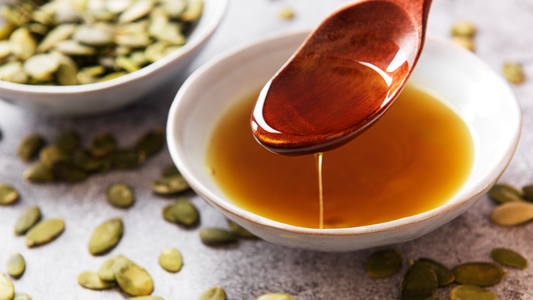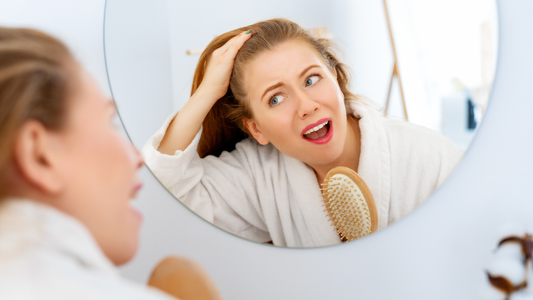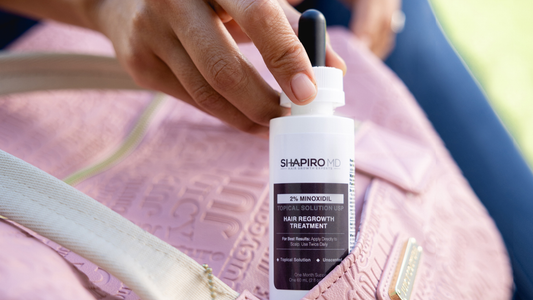During pregnancy, your body goes through a slew of changes in response to a major shift in hormone levels. Between nausea and sore breasts, it's hard to ignore that you don't feel quite like yourself when you're expecting. However, there's a whole other set of changes to anticipate after you give birth as well.
One of the most common concerns that women have after pregnancy is hair loss. According to the American Pregnancy Association, about 40 to 50 percent of women experience postpartum hair loss. It’s usually a temporary symptom that can last up to six months after you give birth.
Even if it doesn't last forever, hair loss can still be frustrating to deal with. If you can't help but notice that you've been losing significantly more hair than usual, don't panic. There are many ways to find relief from this condition and help preserve your precious locks after giving birth.
Here's everything you need to know about hair loss and pregnancy, including some helpful tips for dealing with postpartum hair loss.
Are You Struggling With Postpartum Hair Loss?
While a little hair loss here and there is normal, it's important to recognize when it becomes a problem. The American Academy of Dermatology Association claims that the average adult sheds between 50 and 100 hairs a day. While there's no way to keep track of how many hairs you lose on a daily basis (well, almost no way) you can determine if you're suffering from hair loss by paying attention to the way your locks behave.
For example, if your hair routinely falls out in clumps, this is a major red flag that something is wrong. Shedding is typically spread out during the day, which means it shouldn't be noticeable to you. It's also a good idea to pay close attention to your part. If you see more scalp than you're used to, this means that your part may have begun to widen, which is a telltale sign of hair loss.
In many cases, women experience thinning around the temples as a result of postpartum hair loss. It's also common for hair strands to accumulate on your pillow overnight. If you notice a buildup of hair on your pillow after you wake up in the morning, this may be a sign that you're struggling with significant hair loss after giving birth.
Causes of Postpartum Hair Loss
Postpartum hair loss is a response to fluctuations in your hormones. During pregnancy, several key hormones help nurture you and your growing baby. These include estrogen, hCG, hPL and progesterone.
Estrogen has the strongest link to hair loss. This hormone is created by the placenta to support a healthy pregnancy. After you give birth, your estrogen levels begin to decrease, leading to a number of physical, emotional and mental symptoms. One of the most prominent symptoms is hair loss. Falling estrogen levels cause your hair to grow at a much slower rate and become thinner.
Hormone changes during and after pregnancy can cause other odd hair-related outcomes, including new hair sprouting on previously hairless spots, like around the edge of your scalp. You may notice short, new hairs that were never there before.
Tips for Relief
If you're stressed about the amount of hair you're losing, know that there are simple ways to cut down on all the shedding. These tips will allow you to maintain a thicker, healthier mane even as you go through the postpartum period.
Adjust Your Diet
Your hair relies on essential vitamins and minerals to look its best each day. If you deprive your body of these vital nutrients, you'll notice your hair losing its luster and thickness. You might not be able to control the natural decline of your estrogen levels, but you can combat these effects by fortifying your body with the right foods. Some examples of foods that contribute to healthy locks include: • Salmon • Legumes • Yogurt • Oatmeal • Eggs • Blueberries • Oranges • Sweet potatoes • Peanut butter
Each of these foods contains important nutrients that play a key part in overall hair health. For example, salmon and oatmeal are rich in omega-3s, which nourish your hair with essential proteins. Meanwhile, oranges and blueberries are excellent sources of vitamin B and C, which guard against breakage and boost circulation to your scalp.
Skip the Heat Tools
Your hair is more fragile than usual in the months after you give birth. It's important to be as gentle as possible with your hair to help it stay strong and healthy. To keep your locks in optimal condition, try staying away from heat tools if you can. Curling wands, flat irons and other common styling tools can cause damage to your hair, especially during the postpartum period. It's also a good idea to skip any special salon treatments, such as highlights and straightening sessions.
Wash Less Frequently
You may be tempted to lather up your hair often to keep it looking smooth and sleek, but this typically has the opposite effect. Washing your hair too frequently can cause it to take on a dull, thin appearance. Additionally, bear in mind that you lose strands every time you wash your hair. If you want to preserve as many locks as you can, it's a good idea to cut back on your hair-washing sessions.
Use the Right Shampoo
You already know that different hair types require different shampoo products. However, it's also important to switch up your shampoo depending on the time of year, your physical activity level, and—yes—your hormonal changes.
After your pregnancy is over, seek out products formulated to accelerate hair growth and promote strong, healthy locks, like Shapiro MD's Motherhood collection, which are patented and contain natural growth-promoters. Once you find the right shampoos for your needs, you'll help counteract the unwanted effects of falling estrogen levels.
Talk to A Doctor
While some hair loss is expected after pregnancy, it's important to monitor your shedding to ensure that you're not losing an excessive amount of hair. If you're worried that your hair loss is outside the norm, be sure to speak to a doctor about your concerns.
You may be dealing with a medical condition if you're experiencing any other symptoms in addition to shedding, such as anxiety, a rapid heart rate, fatigue, unexplained weight loss, sensitivity to heat and insomnia. It's crucial to see a doctor as soon as possible to rule out any other medical conditions and to receive proper treatment.
Protect Against Postpartum Hair Loss
Losing more hair than usual is simply a natural response to changing hormone levels. While it can be frustrating to shed your beloved locks, it's important to note that there are many effective ways to guard against these effects, and that they’re typically temporary in nature.
Remember to stock up on plenty of nutrient-rich foods – good for you and baby – avoid styling your hair with heat tools, wash your hair less frequently, and use the right shampoos. Shapiro MD’s Motherhood collection, for example, is dermatologist-recommended and contains all-natural formulations designed for pregnancy and the post-partum period. Keeping these guidelines in mind will help you manage postpartum hair loss in a healthier, more productive way.
Questions or curious about prescription hair growth solutions? A Shapiro MD clinician can help. Take our free hair quiz to find out if custom prescription solutions are right for you.




